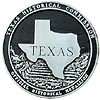A flour mill built here in the 1860s drew pioneer commerce to this site. Flour was a luxury, used mostly for yeast bread, cakes, and biscuits served on Sundays or special occasions. People traveled for considerable distances with their wheat, and waited sometimes for days to have it ground. The original mill property was bought from R. A. Younger in 1867 by John Summers and sons. Several local residents owned shares in ensuing years. The waters of Rock Creek furnished power. Besides this mill and a cotton gin, there may have been other mills here. The Navarro Mills Post Office opened in 1874. A store, school, blacksmith shop, and other facilities were developed. Local leaders included Confederate veterans W. C. French (1821-97) and R. J. Wright (1837--1926). The flour mill ceased operating in 1881. The post office closed in 1882, to be revived only briefly in later years. The community continued to thrive, however. An 1880s newcomer was a former county judge, James C. Key (1817-1910), whose surname survives in the landmark Tandy Key Road. The cemetery, the Baptist church that was formed in 1901, and the tabernacle built in 1915 mark the site of the historic village.
This page last updated: 7/15/2008 |
Navarro Mills Community Historical Marker Location Map, Texas
|
|
Related Themes: Texas C.S.A., Texas Confederate States of America, Confederacy
Explore other
Texas Confederate Historical Markers.
|


